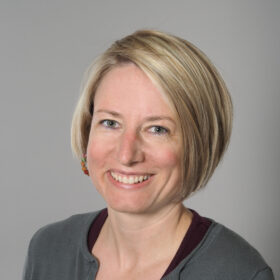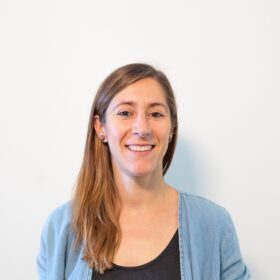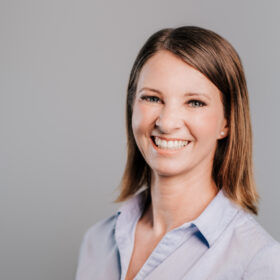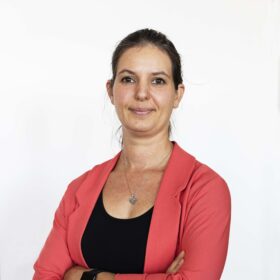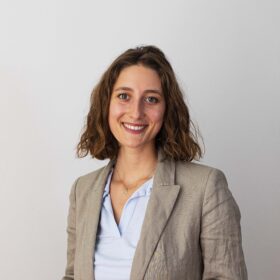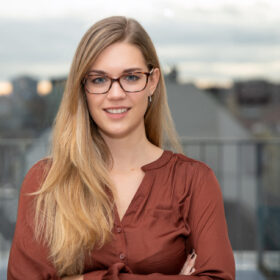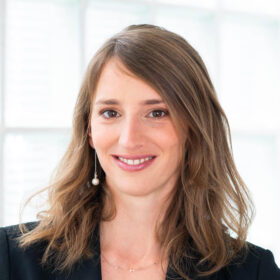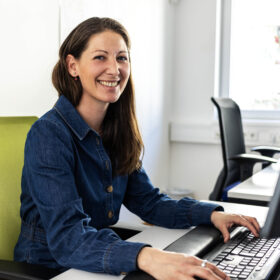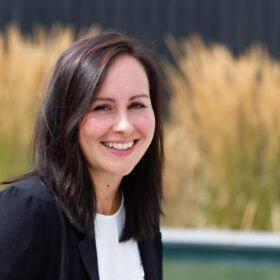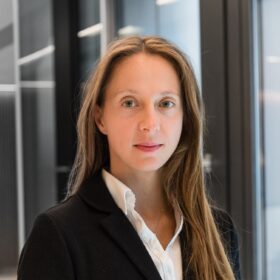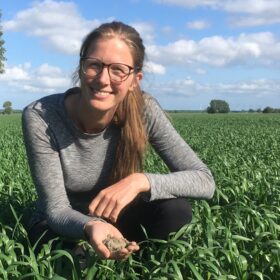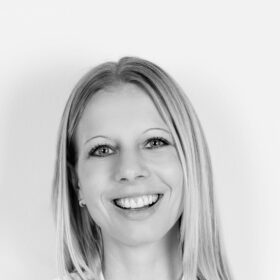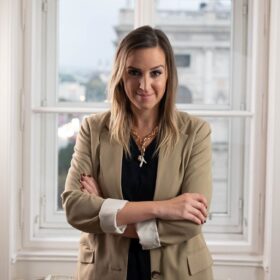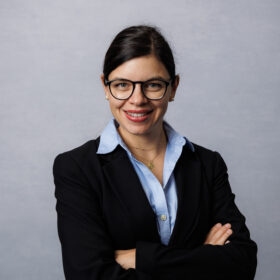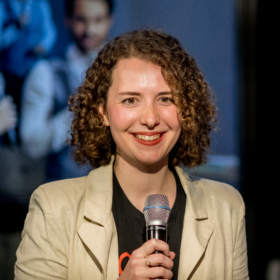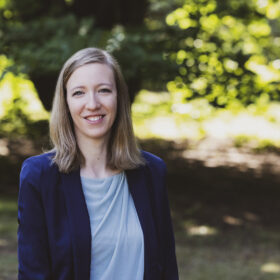Expertin des Monats
Sept. 2010
Prof.in Dr.in Geraldine Fitzpatrick
Prof.in Dr.in Geraldine Fitzpatrick ist FEMtech-Expertin des Monats September.
Geraldine Fitzpatrick, geboren 1958 in Brisbane in Australien, war bereits diplomierte Krankenpflegerin und Hebamme, als sie 1989 ihr Informatikstudium an der Universität von Queensland begann. 1992 schloss sie das Studium mit dem Bachelor of Informatik ab und promovierte anschließend zum PhD in Informatik und Elektrotechnik.
Seit 1998 war Geraldine Fitzpatrick als Projektleiterin und Senior-Forscherin am Distributed Systems Technology Centre in Brisbane forschend im Bereich Computerunterstützte Kooperation, Event-Notification-Systeme bzw. Medizinische Informatik tätig. Anschließend übernahm sie die Positionen Senior-Managerin bei Sapient Ltd London und Dozentin an der Universität Sussex.
Derzeit hat die Informatikerin als Professorin an der Technischen Universität Wien die Leitung des Arbeitsbereichs Human Computer Interaction (HCI) inne. Ihr Forschungsgebiet liegt an der Schnittstelle von technischen und sozialen Wissensbereichen, um damit soziale Wechselwirkungen und das Zusammenarbeiten zu unterstützen. Geraldine Fitzpatrick ist besonders interessiert an greifbaren Applikationen, die in einen alltäglichen Kontext von Arbeit, Spiel und Alltagsleben hineinpassen, zum Beispiel ältere Menschen dabei zu unterstützen zu Hause zu leben.
Interview
Your CV is extraordinary: You started from a traditional "women´s job" - midwife and nurse into a male dominated field - computer science. How come?
It was more circumstances because I had been doing a science degree part time and decided to do some further studies. Concerned by the question how to focus my science degree, I realized that I knew nothing about computers. Therefore I transferred from science to information technology.
So you were captured by computer science?
I think I was challenged rather than captured. It was the challenge because it was so radically different from what I had ever done and it was the achievement of doing that and the potential that I saw rather than being captured by some of those programming types of projects that we did then.
Where there any obstacles?
It was extremely difficult. Studying full time was the biggest obstacle. I was just trying to reconnect with lots of the maths-background. And I think the math side of it was the biggest part because what I had done meanwhile did really not connect to maths in any meaningful way.
But you often look back on your student days and you never appreciated it at the time what a precious period of time it is just to spend 3 years being inspired by ideas and learning new things, developing your skills without a lot of responsibility other than just to yourself to pass the exams.
Probably even better if you are older so you appreciate it more?
I think coming to something like computer science when you are a little bit older - you don´t just come with a narrow view and a lot of people I know have eclectic research careers or career paths like myself. Because you find yourself making connections with other disciplines and ideas rather than just sticking with the mainstream work.
I was thinking what if I would start with computer science now. I had this fear that there are the computer-nerds who grew up with computers and I could never come up with.
You know - I never got to the nerd. I did very well in all my exams because I worked hard but I still struggle with some of the basic technology-things and I am just grateful that my husband is more familiar with it and we often joke that I am the one who is supposed to have a computer science PhD. I think there are multiple ways of doing computer science. You don´t have to be the computer-nerd. I think there is a stereotype of computer science that has the lone programmer sitting and tapping away at the keyboard with the can-mountain and the Pizza-Box-Mountain growing beside them. And we do need people who are highly skilled and highly technical who can write those programs but all of that writing of the programs and all that skill counts for nothing if what they are building doesn´t work for people, or for the reason that they are doing it.
Computer science does not have to do a lot with programming?
Doing computer science is much more than programming. It requires really good people-skills and that is often not thought about. And whether that is all within the one person or within the team of people that create products or systems - there is a diverse skill-set needed in order to get this computer system out and into the world and appreciated and used and offering value.
Did you have a mentor?
Towards the later part of my undergraduate degree there was this wonderful woman called Janet Wiles who started unofficially playing much more of that role who I aspired to be like in some ways. She had come from maths or nuclear physics or some other totally "other" background and had moved into cognitive science and she was doing a lot of work with neural networks. So she was doing really interesting cutting edge research. But what I really liked about her was her passionate teaching not just putting facts into peoples heads but teaching them HOW, how to think, how to be a researcher, how to write. This emphasis on process and that was very influential.
Are you a role model/mentor?
I think you always hope to be. And we certainly did some quite specific things like getting the women together for lunch informally or encouraging the students to apply for the Anita Borg Scholarship that Google run and promoting that or fighting for women´s perspectives on promotion-boards or within faculty meeting so it has always played out in much more informal ways.
What was your personal highlight in your career?
I think the thing that has meant the most is seeing my PhD-students grow and develop.
What is fascinating you in your profession?
In the research-side I think it is the amazing potential of a lot of the new technologies, not the screen sitting on the desks but the little pieces of technology that can be put all around our world, balanced by a real concern that we need to bring a human perspective into it. Otherwise with all this new fancy technology we might end up with a world that we don´t want to live in. I am fascinated by how that is playing out in current debates. I think something like ambient-assisted living - keeping older people at home and caring for them - is an area that illustrates what´s both fascinating and exciting but also perhaps scary and frightening. That´s where these technologies could end up being used to almost keep people isolated in their own home. At least the computer knows that they got up in the morning or opened the fridge door. But we could use the same technology in the home to open up a window into the world where they can connect with people and hobbies and interests and information and give something back. Contribute in ways so that you can still get the information that they got out of bed and opened the fridge door but it is rethinking the way we use these technologies and for whom the are delivering value. So I am fascinated by the potential.
Your field of research is Human Computer Interaction (HCI) which is a very wide field. Could you explain your field of research you work on?
It is worth saying up front that working on human-computer-interaction involves a commitment that, whatever you do, it is about putting people first and their needs first and technology serving these needs or improving quality of life. And working with people to help design technologies rather than thinking you are the expert and you throw it at them. I am very interested in health care technologies which brings together the different parts from my background and I am also very interested in technologies for older people, and bringing those together. So I am also interested in how we think about technologies to support healthcare for older people at home and what that means and different ways of how we can approach it.
And another strand of research is looking at how we can support social interaction and communication. Whether it is face to face or whether it is over a videolink when people are separated. So it is looking at issues of how to support that.
A lot of what we do covers a lifecycle where we will spend time with people at the beginning understanding them and their life situation; we then will build technology and put it back out for people to use, get their feedback and study what happens.
Could you give an example of one particular project?
We had a project with stroke patients and trying to motivate them to make boring exercises with applications like playing chess that they find interesting or engaging. Some of those same motivation issues also play out especially in supporting sustainability and notions of behaviour change, social context and community are important. We have done some work looking at energy monitoring. Now we will probably look more at some of the other sorts of behaviour aspects around - carbon footprints, cycling, as well as how we engage with food and consumption and sustainable practices there. That is in the early phases of being shaped-up.
You work with a multi-disciplinary group. How many female scientists do you have?
In these multi disciplinary groups we always end up having lots of female scientists which is interesting and it is the case here and it was the case back in Sussex as well.
Like percentage men-women? Maybe 50:50?
We are more than 50% in our group. I think the figure will be more like 60%.
That´s not typical...
Not at all! I think that generally there are more women in the HCI-area and more inter-disciplinary backgrounds in the HCI-area than in other areas of computer science.
You have a long list of publications, you are active in many scientific Community services... Is it difficult to match your private life with your work?
Yes it is. It is something I have been reflecting on just lately as well. I have things that I need to see through as commitments now that I can´t get out of. But I need to make more considered choices and prioritize and value all sorts of all different aspects of life -relaxation, fun, friends, as well as work. It comes down to making active choices. I could write one more paper or put in one more project proposal but what´s the cost of doing that? I now have a set of questions that I ask myself before I take on new jobs. It is hard to know how much this is a female thing.
Do you think it is also a matter of learning to say "no"?
Yes. It is, but I think it is learning how to say no in a way that you can live with. All these jobs need to be done. I only get a paper published because 3 other reviewers have given time to read it and to comment and some organizers have been prepared to volunteer time to edit the journal and run the conference. If you count up the hours of voluntary service that people put into one paper getting published, I think there is a moral obligation for everyone to contribute back.
Some people take on more service roles than others and I think a lot of women end up taking on a lot of those service roles. And that is where we need to learn how to value diversity. Because then we will get lots of skills and strengths recognized. Service roles should be valued just as much. But for example if it comes to promotion, and I saw this sitting on promotion boards or processes in both industry and academia, where some women have been killing themselves doing service roles, but the promotion criteria are about personal competitive achievements - how many publications they have. And they have that trade off, in doing service they have not had time to keep up this aspect as much and I do not think that is fair.
So I have to take responsibility for my own life, my own choices and understand what the trade-offs are that I am making. I think institutionally we need to fight for real recognition of diverse strengths, skills and ways of contributing and in recognizing diversity we will pick up a lot of women. It is putting the other things on the table as equal priorities as contributing and serving.
What would you recommend young women who want to enter a similar career path like you?
Don´t accept the dominant paradigm or model, find your own path. Understand what things that excite you and respect those and follow them. Look for new connections and new ways of doing things as well. I think that´s something that women somehow seem particularly good at doing: Making the new connections and finding new ways through. So I think just finding something that you get excited about or care about. And it is hard work. But the thing is: Anything is hard work. SO it is recognising where your passions and skills are, where you get your rewards from and go for it! And TRY. There is no harm in trying and you´d be surprised. And it might not be the nerdy thing.
Vielen Dank fürs Interview!
Das Interview führte Nicole Kajtna.
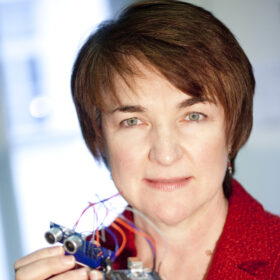
Kontakt
- 01 58801-18735
- geraldine.fitzpatrick@tuwien.ac.at
- https://twitter.com/geri_fitz
- https://twitter.com/ChangeAcadLife
- http://www.changingacademiclife.com
Letzte Aktualisierung: 14.09.2019
